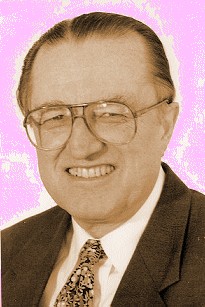Anthony Downs
Anthony Downs ( born November 21, 1930 in Evanston, USA) is an American political scientist and economist.
Life
He studied economics and political science at Carleton College in Northfield, Minnesota and his doctorate in 1956 at Stanford University. Subsequently, he was, inter alia, Professor at the University of Chicago, an analyst at the RAND Corporation and president of the Real Estate Research Corporation. Since 1977 he is a senior fellow for economic studies at the Brookings Institution in Washington, DC. He focuses on democracy research and demographic change.
His ideas of democracy
Downs is a democracy as competition from at least two parties to the exercise of state authority before which opens into recurring elections in which each voter has one vote.
He sees democracy as a process, as a complex exchange system in which individual actors ( voters ) and collective actors (parties) communicate with each other and make their choices according to the maximization of the expected intrinsic utility. Downs understands politics analogous to the economy as a market in which entrepreneurs (parties) buyers ( citizens) offer goods (political programs ). This leads to the rationality axiom of individual utility maximization on the part of " provider" ( parties, government, politicians ) who are in power and their acquisition of power from, and the "consumers" (citizens, voters ). The political program is the parties merely as a means to an end. The rational voter pulls, so Downs, before each election, a cost -benefit balance. Incidental expenses such as the acquisition of information, the thinning of party programs and finally the arrival to the ballot box and the lost time, exceed the resulting benefit. Because, as Downs on, it is not certain whether the selected party will actually form the government. This state of affairs referred Downs as " paradox of voting ". In large democracies, voter turnout, according to Downs would have considerations, are close to zero.
Two of the main theses of Downs, the thesis of the vote maximizing political Provider ( ~ parties ) and the Eigennutzaxiom and principle of rationality on the part of consumers (~ electorate ) so that elections are a central "exchange place " of democracy. The modeling of political processes in accordance with an act of exchange and the basis of the rationality calculus is the approach of the new political economy.
His conditions for a democratic system of government are a full-fledged party competition and public appointments on the basis of universal suffrage. This should take place periodically.
As his most important work applies the published in 1957 in New York City An Economic Theory of Democracy, published in 1968 in German under the title "Economic Theory of Democracy" in Tübingen.
Downs is a member of the Mont Pelerin Society.










